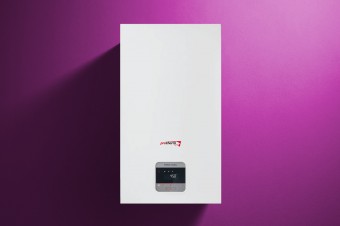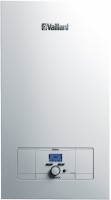FAQ: 10 frequently asked questions about heating boilers

In the event of a malfunction in the operation of heating equipment, it is first of all important to diagnose the unit in order to identify errors. The error codification system allows you to identify the essence of the problem and determine ways to quickly solve it. We have already talked about "Common Error Codes in Gas Heating Boilers" in the article of the same name. For now, let's focus on frequently asked questions from users on heating boilers in general.
1. Why does the boiler turn on and off frequently? The burner often lights up and goes out, why?
There may be several reasons for this. Firstly, setting the automatic heating to a very small range (0.2-0.5 ° C). Secondly, large heat losses in the served room. In a rapidly cooling house, taking into account the minimum setting step for maintaining the desired temperature, the boiler simply has no choice but to turn on and off often.
There is also an absolutely opposite picture - this is a well-insulated house of a small area with a powerful boiler. In this case, the unit, even at minimum power, will be able to heat the required “kvadrature” in a matter of minutes, after which it will turn off.
Finally, a breakdown of the boiler automation system is not ruled out. Specialists will help you deal with the problem.
2. It knocks out an error in the boiler. What to do?
Codification of errors clearly indicates the essence of problems in the operation of heating equipment. You can decipher the specific error code in the instructions for the boiler. There are also often described ways to eliminate it (on their own or with the involvement of involved specialists).
In our portfolio of materials there is a useful article "Common Error Codes in Gas Heating Boilers", which provides decoding of fault codes from leading manufacturers of gas heating equipment.
3. Why does the pressure drop in the heating circuit?
After reaching the operating parameters, the pressure in the heating circuit is usually kept at a stable level throughout the entire heating season. If it drops, the first step is to check the system for coolant leaks. Leaks occur in the pipes and fittings of the heating circuit or radiators.
 |
| Airing radiators is one of the reasons for the pressure drop in the heating circuit. |
Other well-known causes of pressure drops are radiator airing, a defective safety valve or expansion vessel membrane, a pump malfunction, and an incorrectly selected expansion tank volume. In a small volume tank, when heated, an increase in pressure is observed and part of the water is discharged from it through an overpressure valve.
4. How to raise/increase the pressure in the heating circuit?
In the design of most modern heating boilers, there is a manual or automatic make-up valve. The latter option adds fluid to the system without user intervention. It is much less common than manual and is used on board premium units.
5. What is the optimal pressure in the heating system?
In different models of units, the optimal pressure indicators may differ. They are specified in the technical specifications of a particular device. For greater clarity, the optimal pressure zone is usually marked on the pressure gauge scale in green. The average values for it are 1.5-2 atm.
6. Why does the boiler emit noise (hum) and vibration?
Most often, noise occurs due to a decrease in the pressure level in the heating circuit. As a result, air pockets are formed that interfere with the normal circulation of water. It is overheated by the burner, and a dull whistle or howl is heard.
Also, the appearance of extraneous sounds is often associated with scale deposits in the heat exchanger. Mineral deposits narrow the passages for water, reduce the efficiency of the boiler and its heat transfer.
 |
| Deposits and scale impede the normal flow of the coolant along the circuit. |
Vibration is manifested when the boiler is operating at power levels that exceed the permissible values. Another common problem in heating boilers is a problem with the exhaust fan. Over time, the cooler impeller wears out and starts to make noise.
7. Can antifreeze be used instead of water?
At the production stage, the boilers are tested with water. All processes in the heating system are tailored to its physical properties, in particular, fluidity. The viscosity of antifreeze can be completely different, which in the future can adversely affect the performance of the pump. In addition, anti-freeze liquid is more aggressive for various gaskets - over time, they can leak and leak in the system.
Until recently, manufacturers of heating equipment were categorically against the use of antifreeze as a coolant. However, now they themselves offer and make antifreezes. Can these be applied? This moment needs to be clarified for a particular boiler model, as well as a suitable brand of antifreeze.
Independence in the matter of replacing water with antifreeze is not welcome, because of this the boiler may lose its warranty. The “non-freezing” option is applicable, for example, in a country house that has been closed for almost the entire heating season. In general, it is better to use distilled water as a coolant.
8. Hot water in the boiler does not turn on. What are the reasons?
Hot water in the boiler does not turn on for a number of reasons: due to the failure of the flow sensor, low pressure in the system, scale of the heat exchanger, breakdown of the flame sensor, etc. In order not to sort out the unit in vain, to find out a specific problem, it is best to seek help from specialized specialists in the repair and maintenance of heating equipment.
9. Which boiler is needed for a certain area?
From the correct selection of the heating boiler in terms of power level, it directly depends on whether it will be warm in the house. When calculating this indicator, the area and volume of the heated room, the correction for the climatic region, the coefficient of thermal conductivity of walls, windows and doors are taken into account. There is no one way to go here. The standardized rule for counting is that with a ceiling height of about 2.5 m, it takes 1 kW to heat 10 m².
 |
| When calculating the required power of the boiler, it is necessary to take into account a lot of important parameters. |
For a well-insulated new house with energy-efficient double-glazed windows and an entrance group with a vestibule, the smallest of the coefficients is taken. And for a conditional hut that has seen even Tsar Pea, completely different numbers are used in the miscalculation and the required boiler power can be almost twice as much. "By eye" information on the required power of the boiler will not be determined even by a specialist. However, it is advisable to contact him regarding the calculation of parameters and installation of a heating boiler.
10. Can the boiler be installed in the kitchen?
The rules for installing boilers allow their installation in the kitchen. In this case, it is necessary to strictly adhere to certain requirements aimed at ensuring the safe operation of heating equipment in the kitchen. There are restrictions on the minimum required volume of the kitchen, depending on the total heat output of the equipment. In different regions and "under the mood" of a particular gas office, they may differ from each other. All points regarding the installation of the boiler in the kitchen must be clarified with the designer before the construction stage of the house or with the gas company when installing the boiler in the apartment.
Long and trouble-free operation of your heating boiler!
Articles, reviews, useful tips
All materials

































































